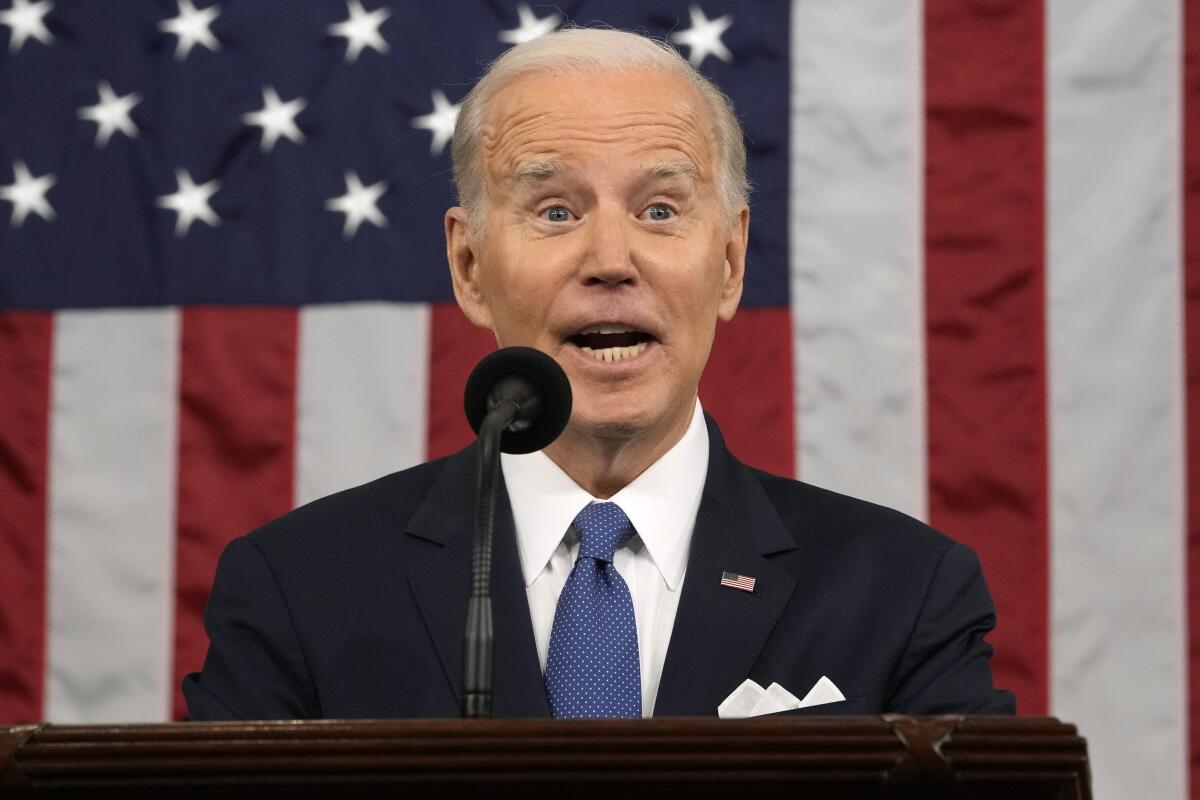Does the 14th Amendment permit the president to bypass the debt ceiling?

WASHINGTON — The Constitution gives Congress the power to impose taxes, to spend the revenue through appropriations and to “borrow money on the credit of the United States” to pay the government’s debts.
To maintain control over its borrowing, Congress has also imposed by law a debt ceiling, now set at about $31.4 trillion.
For a long time, raising that debt ceiling was bipartisan, perfunctory and noncontroversial. But amid deepening partisanship in Washington, Republicans have used the debt ceiling under Democratic presidents to seek budget cuts or other priorities. (Republicans did not hesitate to lift the debt ceiling under President Trump.)
The nation narrowly averted a default under President Obama in 2011 and is confronting that same crisis today.
When faced with this clash, most everyone had assumed there was only option: The two sides must agree on a deal that would lift the current debt ceiling to pay this year’s bills.
Otherwise, the government would default on its debts, potentially triggering chaos in the financial markets and pain for millions of Americans.
But in recent weeks, a once-obscure idea has come to the forefront.
Some legal scholars point to a clause in the 14th Amendment that says the “validity of the public debt, authorized by law ... shall not be questioned.”
According to this untested theory, the president therefore could be seen as having the constitutional duty to bypass Congress and clear the way for more debt to be issued.
Garrett Epps, a legal historian of the 14th Amendment at the University of Oregon, has been writing about this idea for 12 years. He finds that his view, “once dismissed as a fringe theory, has now gone mainstream.”
“Failure to raise the debt ceiling will not reduce the national debt by one penny. It will force a default on existing debt, the first ever,” he wrote. “That will, in turn, decimate the credit of the U.S. government, tank the domestic economy, boost interest rates worldwide as investors demand guarantees against future defaults.”
Harvard Law professor Laurence Tribe said he had changed his view on the issue and now believes the Constitution may require the president to “pick the lesser of two evils” and bypass the debt ceiling.
“As a practical matter, what that means is this: Mr. Biden must tell Congress in no uncertain terms — and as soon as possible, before it’s too late to avert a financial crisis — that the United States will pay all its bills as they come due, even if the Treasury Department must borrow more than Congress has said it can,” he wrote in the New York Times.
Cornell Law professor Michael Dorf goes even further. He argues that the debt ceiling law should be deemed unconstitutional because Congress has put the president in an impossible situation: Congress has set taxes at one level and set spending at a higher level, and now threatens to default on the nation’s debt by preventing borrowing to make up the difference.
Whether this theory is constitutional is up for debate.
Section 4 of the 14th Amendment was adopted to ensure that a post-Civil War Congress with a powerful faction of ex-Confederates could not repudiate the bonds and other debts taken out by the Union to put down those who had engaged in “insurrection or rebellion.”
But the clause has not been limited to that era. In 1935, Chief Justice Charles Evans Hughes cited the 14th Amendment in a decision over government bonds and legal tender.
“We regard it as confirmatory of a fundamental principle which applies as well to the government bonds in question, and to others duly authorized by the Congress,” Hughes wrote. “Nor can we perceive any reason for not considering the expression ‘the validity of the public debt’ as embracing whatever concerns the integrity of the public obligations.”
Most lawyers and government officials, including prominent Democrats, have been wary of invoking the 14th Amendment as a way to get around the debt ceiling, though some don’t rule it out as a last resort.
Last week, Treasury Secretary Janet L. Yellen called it “legally questionable.”
It would require the president to effectively break one law to comply with another constitutional duty.
And it could set off trouble in the bond market if the Treasury Department were to issue new bonds not backed or approved by Congress.
The Justice Department advised Obama years ago he did not have the authority to bypass the debt ceiling. It is not clear whether the government’s lawyers have weighed in during the current controversy.
In the end, the question would probably end up at the Supreme Court. And there’s reason to suggest that the conservative Supreme Court would rule the president had overstepped his authority.
Stanford Law professor Michael McConnell said the Constitution could not be more clear that the powers to tax, spend and borrow were given to Congress, not the president.
“The idea that the 14th Amendment gives the president unilateral power to borrow is dangerous nonsense,” he said.
But Biden said last week he has been “considering the 14th Amendment” and cited Tribe’s changed view on the issue.
Speaking to reporters after meeting with Republican leaders, he said he had made clear that “default is not an option. I repeated that time and time again. America is not a deadbeat nation. We pay our bills. And avoiding default is a basic duty of the United States Congress.”
He said he remained wary of invoking the 14th Amendment as a solution.
“The problem is that it would have to be litigated,” and the courts could put his actions on hold. If so, he could “still end in the same place.”
More to Read
Get the L.A. Times Politics newsletter
Deeply reported insights into legislation, politics and policy from Sacramento, Washington and beyond. In your inbox three times per week.
You may occasionally receive promotional content from the Los Angeles Times.











